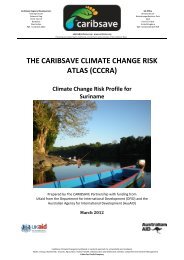You also want an ePaper? Increase the reach of your titles
YUMPU automatically turns print PDFs into web optimized ePapers that Google loves.
each gender group is of the opinion that their group is the more vulnerable of the two. This is explained<br />
later in this section.<br />
The community has experienced severe weather in the past, <strong>and</strong> some residents have also observed<br />
gradual changes in weather patterns. Some patterns that were specifically pointed out by community<br />
residents included an increase in the frequency <strong>and</strong> intensity of hurricanes, increasing ambient<br />
temperatures, warmer sea surface temperatures which has resulted in bleaching of nearshore reefs, <strong>and</strong><br />
sea encroachment. Residents that have some awareness of climate change underst<strong>and</strong> that the effects<br />
have started <strong>and</strong> that the community is at greater risk as time passes. Residents who were previously<br />
unfamiliar with climate change are seemingly now aware of current <strong>and</strong> future implications.<br />
Community observations collectively point towards an increasing frequency of severe weather systems<br />
impacting the <strong>Turks</strong> <strong>and</strong> <strong>Caicos</strong> Isl<strong>and</strong>s, highlighting that three hurricanes were experienced within the last<br />
5-6 years, before which the last storm of that magnitude affecting the community was in 1985, <strong>and</strong> prior to<br />
that, 1960. Further, two of these three systems affected the country in 2008 within a span of two weeks<br />
(Tropical Storm Hanna <strong>and</strong> Hurricane Ike). It was suggested that climate change contributes to the “crazy”<br />
<strong>and</strong> unpredictable tracks that hurricanes are taking. This perception was based on the behaviour exhibited<br />
by Tropical Storm Hanna, which initially passed the <strong>Turks</strong> <strong>and</strong> <strong>Caicos</strong> Isl<strong>and</strong>s, but subsequently “looped<br />
back” <strong>and</strong> affected the country extensively.<br />
Lower Bight residents also experienced extremely high temperatures this year compared to previous years,<br />
<strong>and</strong> daytime temperatures during the summer period are reportedly hotter than pervious times, <strong>and</strong> occur<br />
more frequently, even though part of the summer period coincides with the wet season. It was also<br />
highlighted that the occurrence of extremely hot days appeared to have started much earlier in 2011 than<br />
before. Winter months were also reported to be warmer than normal.<br />
An apparent explosion in the mosquito population has also been observed by community residents within<br />
Lower Bight, which likely indicates that breeding spaces have grown or are left unattended. The mosquitoes<br />
are considered a nuisance in the very least, <strong>and</strong> potentially pose a severe threat to well-being of<br />
community residents, especially in the event that it is the Aedes aegypti species – the Dengue Fever carrier.<br />
Marine biodiversity has also declined as there are less species observed in the water, as well as smaller<br />
populations of fish. Fishermen have expressed the need to sail further out to get a “decent-sized” catch,<br />
<strong>and</strong> they have also noticed that the size of some species (e.g. conch) is continually decreasing. The decline<br />
in life stocks have not only been observed by residents, but visitors as well. A story was relayed where one<br />
tourist noticed the decline in fish stocks <strong>and</strong> had expressed disappointment because his gr<strong>and</strong>children who<br />
were on holiday with him were unable to see the fish that he observed in abundance on previous trips.<br />
Beach erosion <strong>and</strong> sea encroachment also appears to be a serious issue. Residents reported that one house<br />
in the area no longer exists as a result of the encroaching water, <strong>and</strong> some properties with swimming pools<br />
on the beach were affected <strong>and</strong> the pools were subsequently demolished. Residents who work at sea are<br />
aware that natural erosion cycles occur, but the extensive amount of erosion that has taken place during<br />
these cycles is reported as unusual.<br />
Impacts of Weather <strong>and</strong> Climate on Community Livelihoods <strong>and</strong> Development<br />
In the Lower Bight area, there were very few significant impacts on residents from recent extreme events,<br />
specifically Tropical Storm Hanna <strong>and</strong> Hurricane Ike in 2008. Tropical Storm Hanna <strong>and</strong> Hurricane Ike were<br />
only a week apart, but the experiences from Tropical Storm Hanna potentially saved lives <strong>and</strong> property<br />
during the passage of Hurricane Ike, because after the experience of Hanna, residents took Hurricane Ike (a<br />
much stronger system) more seriously. There was no loss of life, or significant loss of property. There were<br />
101





